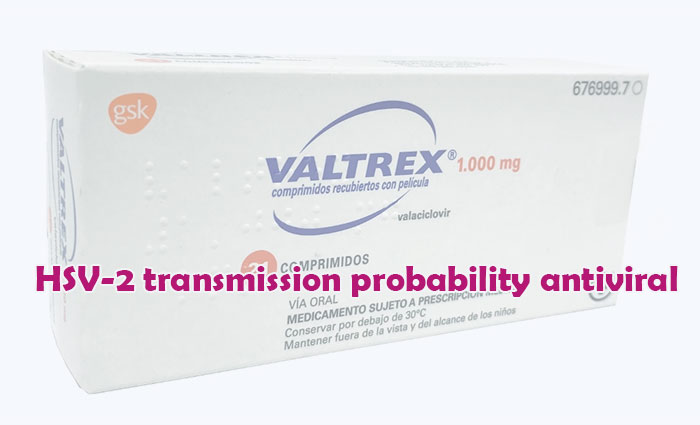What Is the Transmission Rate of HSV-2 With Antivirals?
Herpes simplex virus type 2 (HSV-2) is one of the most common sexually transmitted infections (STIs) globally. While the diagnosis can be emotionally challenging, advances in treatment have provided powerful ways to manage the virus. Among the most critical questions individuals have is: What is the HSV-2 transmission rate with antivirals?

Understanding herpes transmission on antivirals helps people living with HSV-2 make informed, empowered decisions about their health and relationships.
This article explores the science behind suppressive therapy, the role of antiviral medications, and answers key concerns like: Does valacyclovir reduce HSV-2 transmission? and What are the chances of transmitting HSV-2 on suppressive therapy?
Understanding HSV-2 and How It's Spread
HSV-2 is primarily spread through genital-to-genital contact, though it can also be transmitted through oral-genital contact. Most infections are spread when no visible sores are present, due to something called asymptomatic viral shedding.
This is where HSV-2 suppression therapy effectiveness comes into play. Even when you feel fine and have no visible outbreaks, the virus can still be active on the skin. That's why simply avoiding sex during outbreaks is not enough to prevent transmission. Many people transmit HSV-2 unknowingly during these asymptomatic periods.
The Role of Antivirals in Reducing HSV-2 Transmission
Why antiviral medications can significantly reduce the risk of HSV-2 transmission? Several studies have shown that antiviral medications can significantly reduce the risk of HSV-2 transmission. Here's how they do it:
- Reduced Viral Shedding: Antiviral drugs help suppress viral shedding, which is when the virus is released from the skin or mucous membranes even in the absence of visible sores. Lower levels of viral shedding mean a decreased chance of transmitting the virus to a sexual partner.
- Fewer Outbreaks: Medications like valacyclovir, when taken as suppressive therapy, can reduce the frequency and duration of outbreaks. Fewer outbreaks mean fewer opportunities for transmission.
- Lower Viral Load: Antiviral drugs can reduce the quantity of virus present in the genital or oral area, further decreasing the risk of transmission.
- Protection for Partners: Taking antiviral medication as prescribed can make the person with HSV-2 less contagious, thus providing protection to their sexual partners.
Positive Singles: The #1 dating site to meet other people with herpes

PositiveSingles is one of the most popular dating websites for people suffering from herpes and other STD. It was initiated in 2001. With 1,510,800+ members you are sure to find lots of potentail people around you.
The most commonly prescribed antiviral medications for HSV-2 are valacyclovir, acyclovir, and famciclovir. Among these, valacyclovir (brand name Valtrex) is often favored due to its convenient once-daily dosing and strong track record in reducing both outbreaks and transmission risk.
So, does valacyclovir reduce HSV-2 transmission? Yes, significantly. When taken daily as suppressive therapy, valacyclovir has been shown to reduce the risk of HSV-2 transmission to a sexual partner by nearly 50%. When combined with condom use and avoiding sex during active outbreaks, this reduction becomes even more profound.
This is why many couples ask: What is the HSV-2 transmission rate with antivirals? In clinical trials, the annual transmission rate in discordant couples (where one person has HSV-2 and the other doesn't) dropped from around 10% to 4-5% when the HSV-positive partner took daily valacyclovir. That figure can dip lower when combined with other protective strategies.
HSV-2 Transmission Rate With Antivirals: The Numbers
- Without any protection (no antivirals, no condoms): ~10%–12% annual transmission risk
- With suppressive therapy only: ~4%–5% annually
- With suppressive therapy and condom use: as low as 1%–2% annually
These numbers reinforce the power of antiviral medications in reducing the likelihood of transmission.
HSV-2 Suppression Therapy Effectiveness
Daily antiviral treatment is referred to as suppressive therapy. It has a twofold effect: reducing the frequency and severity of outbreaks, and lowering the chances of spreading HSV-2 while on medication.
The HSV-2 suppression therapy effectiveness is due in large part to the way antivirals work. They interfere with the virus's ability to replicate, which means less viral shedding from the skin. Less viral shedding means fewer opportunities for transmission—even when no visible symptoms are present.
A common question people ask is, What are the chances of transmitting HSV-2 on suppressive therapy? While not zero, the risk is dramatically lower compared to those who aren't taking antivirals. Combined with open communication and other preventative measures, suppressive therapy is one of the most effective tools in the herpes prevention toolkit.
Does Valacyclovir Reduce HSV-2 Transmission During Asymptomatic Periods?
Absolutely. The study most often cited on this subject, published in the New England Journal of Medicine, found that daily valacyclovir reduced transmission by 48% overall. More strikingly, it reduced symptomatic transmission (i.e., when the partner developed noticeable symptoms) by 75%.
This is important because most people worry not just about spreading the virus but about giving someone visible symptoms. When discussing does valacyclovir reduce HSV-2 transmission, the evidence shows it reduces both symptomatic and asymptomatic spread.
Thus, the chances of spreading HSV-2 while on medication—especially valacyclovir—are far lower than without it.
Herpes Transmission on Antivirals vs. Without Treatment
How effective are antiviral medications at preventing hsv2 infection? Several studies have shown that antiviral medications can significantly reduce the risk of HSV-2 transmission. A study conducted over eight months revealed the following transmission rates:
While antiviral medications are highly effective in reducing transmission probability, it's essential to keep in mind that they are not a foolproof solution. Medications must be taken consistently as prescribed to be effective. Skipping doses can increase the risk of viral shedding and outbreaks.
Let's compare what happens in a real-world scenario:
Without antivirals:
Person A has HSV-2. They avoid sex during outbreaks but do not use antivirals or condoms. The partner has about a 10%–12% annual chance of contracting HSV-2.
With antivirals:
Person A takes valacyclovir daily. The HSV-2 transmission rate with antivirals drops to about 4%–5%. If condoms are also used, the rate drops to below 2% annually.
This significant drop in herpes transmission on antivirals gives couples more control and peace of mind.
Real-Life Example: A Discordant Couple
Consider a monogamous couple where one partner is HSV-2 positive, and the other is not:
- They discuss risks openly.
- The HSV-2-positive partner takes daily valacyclovir.
- They use condoms consistently.
- They avoid sexual contact during any prodromal symptoms.
In this situation, the chances of spreading HSV-2 while on medication and using protection are very low—perhaps 1% annually or even less.
Many couples in this position go years without transmission, and some remain virus-free for life.
What Are the Chances of Transmitting HSV-2 on Suppressive Therapy?
What are the chances of transmitting HSV-2 on suppressive therapy? Based on the best available data:
- Without suppressive therapy or condoms: ~10%–12% annual risk
- With suppressive therapy alone: ~4%–5%
- With suppressive therapy and condoms: <2%
These statistics highlight the power of suppressive therapy. Though no method is 100% effective, the HSV-2 suppression therapy effectiveness speaks volumes.
Emotional Relief for Those Living With HSV-2
Beyond the physical impact, knowing the HSV-2 transmission rate with antivirals can be emotionally comforting. Many people with HSV-2 fear rejection or avoid intimacy altogether due to fear of transmitting the virus.
Understanding that herpes transmission on antivirals is low can reduce anxiety, encourage healthy relationships, and make open conversations with partners more manageable. Disclosing HSV-2 doesn't have to be a deal-breaker when you can clearly explain, with evidence, how the chances of spreading HSV-2 while on medication are minimal with the right precautions.
Conclusion
So, does valacyclovir reduce HSV-2 transmission? Unequivocally, yes. The HSV-2 suppression therapy effectiveness is well-documented, and the use of antivirals like valacyclovir significantly lowers the HSV-2 transmission rate with antivirals.
For those wondering, what are the chances of transmitting HSV-2 on suppressive therapy, the answer is: very low—especially when combined with condoms, communication, and outbreak awareness.
Ultimately, herpes transmission on antivirals is far from inevitable. With responsible management, the chances of spreading HSV-2 while on medication can be brought down to levels that allow for confident, loving relationships without fear.
Antiviral medications have emerged as an essential tool in reducing the transmission probability of HSV-2. What is the HSV-2 transmission probability on antiviral? We will explore the effectiveness of antiviral medication in lowering the transmission risk of HSV-2.
Worry about herpes tranmission? Meet nearby people with herpes

PositiveSingles is one of the most popular dating websites for people suffering from herpes and other STD. It was initiated in 2001. With 1,510,800+ members you are sure to find lots of potentail people around you.
Join and meet nearby people with herpes, browse profiles and chat now!
